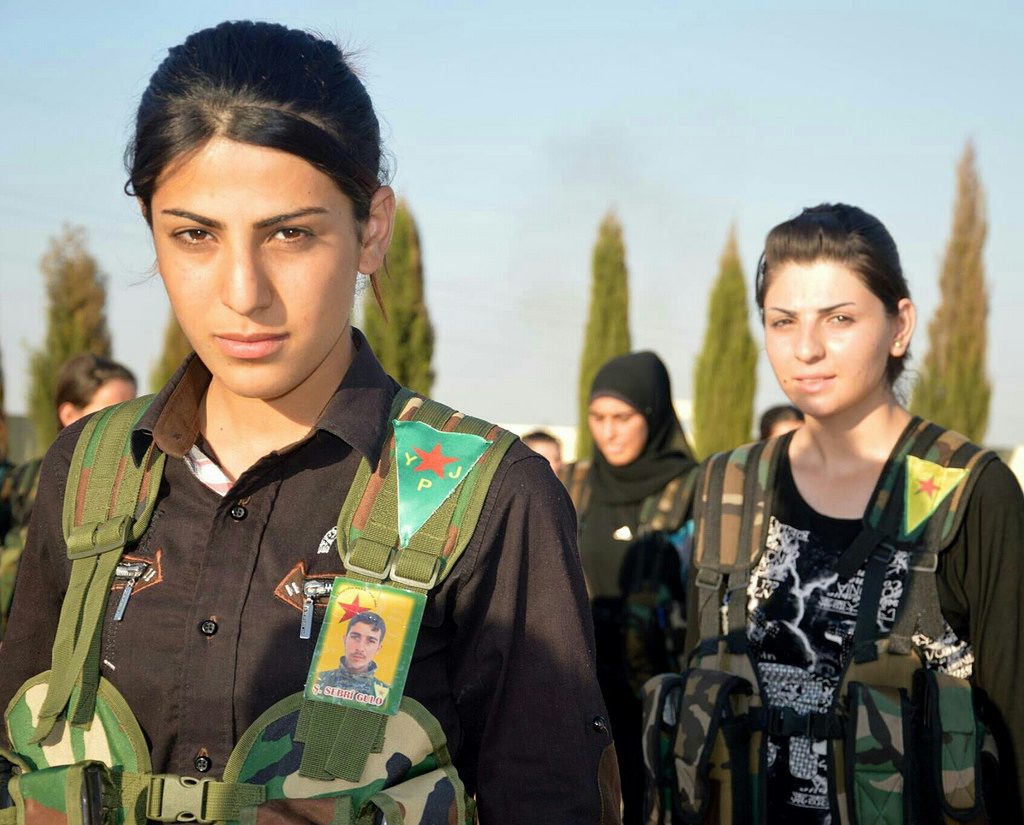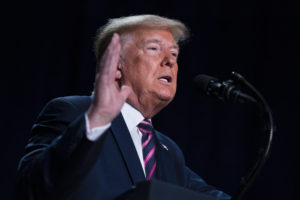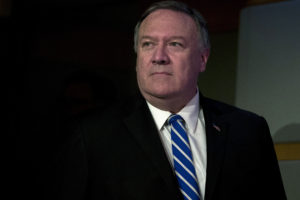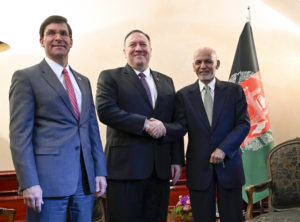Beware of Kurdish Blowback
The U.S. is about to sell out the Kurds. The next time we need loyal allies in the Middle East, don’t be surprised to hear crickets. Kurdish YPG fighters. (Kurdishstruggle / CC BY 2.0)
Kurdish YPG fighters. (Kurdishstruggle / CC BY 2.0)
Meet the YPG, the militia of the Syrian Kurdish Democratic Union Party. They defeated the so-called Islamic State and—abetted by ample U.S. airstrikes—seized Raqqa, the capital of Islamic State. They’re also staunch feminists, aggressively progressive and secular. A real anomaly in the repressive, largely illiberal Middle East.
They are just the kind of folks America could really get behind, right? Hardly.
In a phone call last week with Turkish President Recep Tayyip Erdogan, President Trump sold them out. The leader of the free world reportedly promised to cut off arms supplies and most aid to the Kurdish militias in northeast Syria. Turkey, of course, hates the YPG and considers them one and the same as their own separatist Kurdish foes in the (terrorist) Kurdistan Workers’ Party, or PKK. Maybe, though to some extent that’s debatable.
But hold on a second. Isn’t Islamic State America’s gravest adversary, an existential threat to our values and the greatest global threat since Hitler? After all, Islamic State loomed large as a proverbial punching bag during Trump’s presidential campaign. Remember, he promised to “bomb the shit” out of these villains. Trump even had a “secret plan” to defeat the group that he (preposterously) alleged President Obama had founded.
You’d think Trump would laud Kurdish accomplishments and throw a ticker-tape parade to thank the Kurds for vanquishing “evil.” Don’t count on it. Take one look at neighboring Iraq, where the U.S. backed Baghdad’s decision to forcefully roll back Kurdish territory and independence aspirations.
No doubt Islamic State had served its purpose as cartoon bad guys for Trump the presidential aspirant, but the truth was far more lackluster. Turns out the “secret plan” boiled down to a simple, if familiar, formula: American bombs, Kurdish (and some Arab) blood. Now, those who sacrificed so much are on their own, surrounded by enemies—Turkey, Bashar Assad’s Syrian military, the Iraqi army, Hezbollah and assorted Arab Islamist groups, some loosely affiliated with al-Qaida. The YPG has a tough road ahead. I am anti-interventionist by temperament and experience. The potential for escalation, quagmire and blowback is all too real in Syria, or anywhere in the Greater Middle East. Sixteen years and countless indecisive, undeclared wars convey as much all too clearly. Sometimes, sober strategy demands hard, realist decisions in foreign policy, and committing American blood and treasure to a tenuous, nascent Kurdish state presents potential pitfalls.
Still, something doesn’t sit right for me about this outright abandonment of America’s most loyal—and most progressive, if imperfect—allies in the region. Maybe it’s personal. After all, as I toiled away in Baghdad back in 2007, I fantasized about an assignment in the relative safe haven of Irbil, in Kurdistan, where no one attacked American troops and you could grab a burger at a familiar neighborhood McDonald’s franchise. As dozens of U.S. troops, and hundreds of Iraqi civilians, were cut down each month on Baghdad’s streets, the Kurdish north seemed like a distant paradise. But it’s more than that. Both ethically and strategically, dropping the Kurds is disturbing.
The Kurdish-dominated Syrian Democratic Forces, or SDF (a clever rebranding of YPG) were, after all, the most effective fighters against Islamic State, America’s sworn enemy. Besides, on an operational level, competent (and non-Islamist) allies are hard to come by in the troubled region. Drop the Kurds, and what’s the lesson to future partners? Don’t trust the Americans—they’ll sell you out in a second. Morally (a tricky term in foreign affairs), it is uglier still. Weaken the Kurds and one inevitably empowers the brutal Assad regime, which, incidentally, is responsible for far more civilian deaths than Islamic State. If Syrian well-being is not, in fact, an American concern—fine, then say that. What of basic human rights? As the U.S. cuts loose the resolutely feminist, and mainly secular, Kurds, it simultaneously backs (and sells arms to) a Saudi regime that only very recently let women drive and still beheads or stones women to death for charges ranging from adultery to “sorcery.” Rather disturbing, no? Even for a calculating, “realist” American administration.
So who are we allied with in Syria, if not the Kurds? The whole thing is a counterintuitive, byzantine mess. Obama tenuously opposed Assad, whereas Trump appears more comfortable tolerating his vicious regime. The purported “bad guys” of Russia, Iran and Hezbollah (which the U.S. considers a terrorist group) back Assad. But they also oppose Islamic State and other jihadi groups. We agree on that. Iraqi Shiite militias—backed by Iran—also fought for Assad. When they’re on the Iraqi side of the artificial border fighting Islamic State we support the militias. In Syria, they back an Assad regime we ostensibly denounce. Turkey is a longtime NATO ally, but it is inching closer to Russia, and we’ve disagreed in the past over arming the Kurds. Those Kurds, and what’s left of the “moderate” Syrian opposition to Assad, well, they’re on their own.
Who can keep up? Truth be told, Trump, like Obama before him, lacks anything approaching a coherent strategy in Syria. Islamic State may be down, for now, but Assad, Russia and Iran appear to hold the strongest hand and, along with Turkey, seem to be excluding the U.S. from any meaningful role in any postwar settlement.
All right, so maybe strenuously and continuously backing an independent Kurdish entity in Syria isn’t sound policy. Perhaps U.S. intervention in the region is often counterproductive, and less is, in fact, more. Maybe so. Then again, America can hardly continue to tout itself as an “indispensable” nation, Ronald Reagan’s “Shining City on a Hill,” so long as it perpetrates Machiavellian, Mafioso-style betrayals across the Middle East.
However, given the disposition of this president, calls for an “America First” foreign policy and Trump’s militarized circle of advisers, I’d predict more to come. And, to add to the absurdity, expect U.S. leaders to continue hyping America as an “exceptional” beacon of hope. Cognitive dissonance: Consider it the new national pastime.
The tragedy is there’s just so much to like about the valiant Kurdish fighters. They did most of the dirty work defeating Islamic States’ conventional forces. Furthermore, their vague democratic socialism and radical gender equality are far more progressive than politics in our own country. No wonder Trump is apt to drop these strange bedfellows. So it goes, and so the Kurds will be left to fend for themselves. Few Americans are even paying attention anymore.
The next time (and there’s always a next time) the U.S. needs loyal allies, don’t be surprised to hear crickets. After all, America’s message to the stalwart Kurds fits this age of vacuous military pageantry: Thanks for your service. Now, good luck.
The views expressed in this article are those of the author, expressed in an unofficial capacity, and do not reflect the official policy or position of the Department of the Army, Department of Defense or the U.S. government.
Maj. Danny Sjursen is a U.S. Army officer and former history instructor at West Point. He served tours with reconnaissance units in Iraq and Afghanistan. He has written a memoir and critical analysis of the Iraq War, “Ghost Riders of Baghdad: Soldiers, Civilians, and the Myth of the Surge.” He lives with his wife and four sons in Lawrence, Kan. Follow him on Twitter at @SkepticalVet.
Your support matters…Independent journalism is under threat and overshadowed by heavily funded mainstream media.
You can help level the playing field. Become a member.
Your tax-deductible contribution keeps us digging beneath the headlines to give you thought-provoking, investigative reporting and analysis that unearths what's really happening- without compromise.
Give today to support our courageous, independent journalists.






You need to be a supporter to comment.
There are currently no responses to this article.
Be the first to respond.